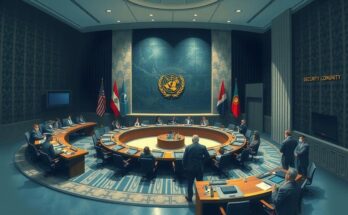U.S. Secretary of State Marco Rubio praised President Trump’s proposal to redevelop Gaza as a generous offer, emphasizing the urgent need for reconstruction. He also highlighted the significant operational changes at USAID due to lack of cooperation. Additionally, a new agreement with Guatemala allows for the reception of deportees from the U.S., marking a strategic focus on immigration and aid policies.
U.S. Secretary of State Marco Rubio recently described President Donald Trump’s proposal for revitalizing Gaza, envisioning it as the “Riviera of the Middle East,” as an act of generosity. Rubio characterized the current state of the region as resembling a natural disaster, citing issues such as unexploded munitions and significant debris, making it uninhabitable for its residents. During a press conference in Guatemala City, he emphasized the necessity of relocating people during the reconstruction process.
In related discussions, Rubio addressed the significant changes at the U.S. Agency for International Development (USAID). He indicated that the lack of cooperation from agency personnel led to a shift in operations, which was not the administration’s original intention. This abrupt adjustment means that nearly all USAID staff overseas will be withdrawn from their duties, impacting ongoing programs.
Moreover, discussions with Guatemala’s president have led to an agreement to accept deported migrants from the U.S., including individuals from various countries. This “safe third country” agreement, established under President Bernardo Arévalo, aims to facilitate the return of deportees to their home nations at U.S. expense. Rubio’s emphasis on immigration reform marks a primary focus of his inaugural diplomatic voyage in Central America.
Marco Rubio’s statements highlight the U.S. diplomatic stance concerning Gaza’s reconstruction following ongoing conflicts. The proposal to enhance Gaza’s infrastructure underscores a strategic foreign aid effort by the Trump administration. Additionally, the upheaval at USAID signals a shift in the execution of international aid, reflecting broader changes in U.S. foreign policy priorities, particularly concerning immigration within Central America.
In conclusion, Secretary Rubio’s remarks underscore the dual focus of U.S. foreign policy: reconstructing Gaza and addressing immigration issues in Guatemala. His characterization of Trump’s proposal as generous serves to reinforce the U.S. commitment to improving conditions in conflict-affected regions while formal agreements with Guatemala reflect strategic diplomatic efforts to manage migration flows. These developments signify evolving approaches to international aid and cooperation under the current administration.
Original Source: www.dailycamera.com




